Suicide grief is a complex journey where the deep loss of a loved one meets questions about mental health. It highlights the importance of self-care, social support, and mental health awareness during this unique phase of mourning.
What Is Suicide Grief?
Suicide grief is the unique and profound form of grief [mfn] Tal Young, I., Iglewicz, A., Glorioso, D., Lanouette, N., Seay, K., Ilapakurti, M., & Zisook, S. (2012). Suicide bereavement and complicated grief. Dialogues in clinical neuroscience, 14(2), 177–186. https://doi.org/10.31887/DCNS.2012.14.2/iyoung [/mfn] experienced by individuals who have lost a loved one to suicide. It is also known as suicide bereavement.
Suicide grief differs from other forms of grief due to the complex emotions and questions that often arise in the aftermath of suicide. This type of grief can be particularly challenging because survivors may grapple with feelings of guilt, shame, anger, and confusion, in addition to the usual grief-related emotions.
The global prevalence of suicide grief is difficult to quantify accurately, as it is often under-reported and not systematically tracked in many regions. However, suicide is a global issue, and suicide bereavement affects countless individuals and families worldwide.
Signs Of Suicide Grief
The common signs [mfn] Zisook, S., & Shear, K. (2009). Grief and bereavement: what psychiatrists need to know. World psychiatry : official journal of the World Psychiatric Association (WPA), 8(2), 67–74. https://doi.org/10.1002/j.2051-5545.2009.tb00217.x [/mfn] of dealing with suicide loss include:
- Intrusive thoughts about the deceased person’s suicide.
- Persistent questioning and rumination about why the suicide occurred.
- Difficulty concentrating and making sense of the loss.
- Overwhelming sadness and sorrow.
- Guilt and self-blame, often accompanied by “what if” statements.
- Anger or resentment towards the deceased, themselves, or others.
- Intense feelings of shock, disbelief, or numbness.
- Social withdrawal and isolation.
- Changes in sleep patterns, including insomnia or excessive sleeping.
- Appetite changes, resulting in significant weight loss or gain.
- Engaging in risky behaviors or self-destructive actions.
- Loss of interest in previously enjoyed activities.
Read More About Insomnia Here
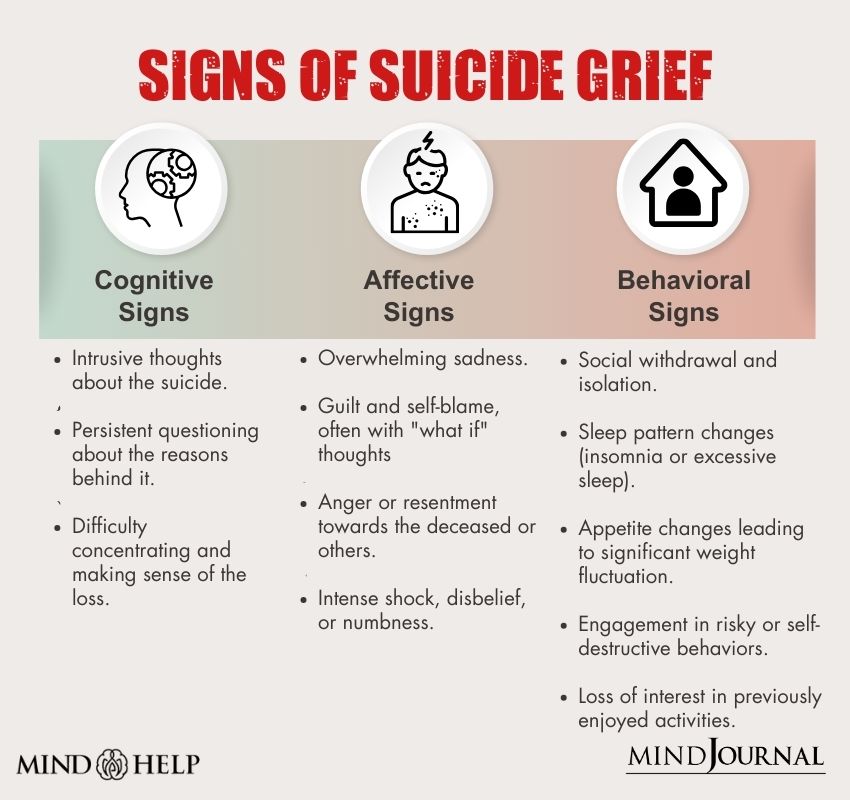
Characteristics Of Suicide Grief
Understanding the different characteristics [mfn] Sveen, C.-A., & Walby, F. A. (2008). Suicide Survivors’ Mental Health and Grief Reactions: A Systematic Review of Controlled Studies. Suicide and Life-Threatening Behavior, 38(1), 13–29. https://doi.org/10.1521/suli.2008.38.1.13 [/mfn] of suicide bereavement can aid in recognizing and addressing the complexities of the grieving process:
1. Acute Grief
Acute grief is marked by intense and overwhelming emotions like deep sadness, anger, and shock. Physical symptoms, such as headaches and fatigue, may accompany these emotions, making daily life challenging. People in this phase struggle with concentration, decision-making, and maintaining routines due to the emotional turmoil.
Read More About Decision-Making Here
2. Integrated Grief
Integrated grief is a stage where individuals gradually adapt to life without their loved one. Emotions become less intense, and people start rebuilding their lives, forming new routines and connections while preserving the memory of the deceased. Acceptance of the loss is a central feature, allowing individuals to move forward while honoring their loved one’s memory.
3. Complicated Grief
Complicated grief is characterized by prolonged, intense distress that doesn’t naturally diminish over time. It involves persistent yearning and intrusive thoughts about the deceased, making it difficult to engage with the present. This form of grief can significantly impair social, occupational, and personal functioning, necessitating professional intervention and support.
Mental Health Impact Of Suicide Grief
Dealing with suicide loss and grief can lead to various mental health conditions [mfn] Spillane, A., Matvienko-Sikar, K., Larkin, C., Corcoran, P., & Arensman, E. (2018). What are the physical and psychological health effects of suicide bereavement on family members? An observational and interview mixed-methods study in Ireland. BMJ open, 8(1), e019472. https://doi.org/10.1136/bmjopen-2017-019472 [/mfn] . Firstly, it often increases the risk of developing major depressive disorder (MDD) due to the profound loss and complex emotions involved. This can result in persistent sadness, hopelessness, and a disinterest in once-enjoyed activities.
Additionally, suicide grief may trigger post-traumatic stress disorder (PTSD) symptoms, especially for those who witnessed or discovered the aftermath of the suicide. This can manifest as flashbacks, nightmares, and intrusive thoughts about the traumatic event. Furthermore, it can lead to complicated grief disorder (CGD), anxiety disorders, substance abuse, and an increased risk of suicidal thoughts or attempts.
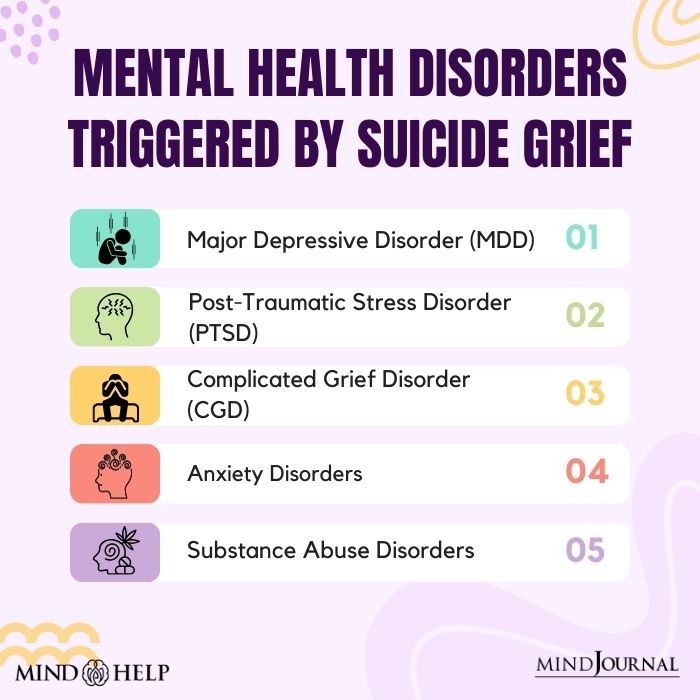
Factors Involved In Suicide Bereavement
The common factors [mfn] Andriessen, K., Krysinska, K., & Castelli Dransart, D. A. (2020). Editorial: Grief After Suicide: A Health Perspective on Needs, Effective Help, and Personal Growth. Frontiers in psychology, 11, 614405. https://doi.org/10.3389/fpsyg.2020.614405 [/mfn] associated with dealing with suicide loss include:
- Stigma And Shame: survivors often face social stigma and feelings of shame due to the stigma surrounding suicide.
- Guilt And Self-blame: many survivors experience profound guilt and self-blame, questioning their role in the suicide.
- Complex Grief: Grief after suicide tends to be more complicated and extended than other types of bereavement.
- Trauma Responses: Witnessing or discovering a suicide can lead to symptoms of post-traumatic stress disorder (PTSD).
- Social Isolation: Survivors may isolate themselves due to difficulties discussing the suicide, leading to loneliness.
- Mental Health Risks: Survivors have a higher risk of developing mental health issues like depression, anxiety, and substance abuse.
- Specialized Support: Due to the unique challenges, survivors often require specialized support and therapy (like suicide grief counseling) tailored to suicide grief.
Read More About Post-Traumatic Stress Disorder (PTSD) Here
Treatment For Suicide Grief
Effective treatment for suicide grief plays a crucial role in helping individuals navigate the challenging emotional landscape that follows the loss of a loved one to suicide. The common treatment methods [mfn] Zisook, S., Shear, M. K., Reynolds, C. F., Simon, N. M., Mauro, C., Skritskaya, N. A., Lebowitz, B., Wang, Y., Tal, I., Glorioso, D., Wetherell, J. L., Iglewicz, A., Robinaugh, D., & Qiu, X. (2018). Treatment of Complicated Grief in Survivors of Suicide Loss: A HEAL Report. The Journal of clinical psychiatry, 79(2), 17m11592. https://doi.org/10.4088/JCP.17m11592 [/mfn] included in dealing with suicide loss include:
- Suicide Grief Counseling: Specialized counseling for suicide bereavement helps individuals cope with complex emotions and provides a safe space to express feelings.
- Supportive Therapy: Offers emotional support and guidance to navigate the grieving process.
- Acceptance And Commitment Therapy (ACT): Focuses on accepting difficult emotions and values-based actions to promote healing.
- Trauma-Focused Therapy: Addresses trauma responses and PTSD symptoms often present in suicide grief.
- Cognitive-Behavioral Therapy (CBT): Helps individuals challenge negative thought patterns and develop healthier coping strategies.
Read More About Cognitive-Behavioral Therapy (CBT) Here
How To Deal With Suicide Grief
Consider the following measures [mfn] Hawton K. (2007). Complicated grief after bereavement. BMJ (Clinical research ed.), 334(7601), 962–963. https://doi.org/10.1136/bmj.39206.507488.BE [/mfn] on how to deal with suicide grief:
- Seek professional help from therapists or support groups specializing in suicide bereavement.
- Allow yourself to grieve without judgment and acknowledge your complex emotions.
- Engage in self-care practices, including regular exercise, proper nutrition, and sufficient sleep.
- Reach out to friends and family for emotional support and avoid isolating yourself.
- Consider memorializing your loved one through creative or meaningful activities.
- Educate yourself about suicide to better understand the complexities surrounding it.
- Attend survivor support groups or therapy sessions to connect with others who share similar experiences.
- Be patient with yourself and recognize that healing is a gradual process.
- Create a safe space to express your feelings, whether through writing, art, or talking to a trusted person.
- Avoid making major life decisions during the acute stages of grief, as emotions can be overwhelming and cloud judgment.
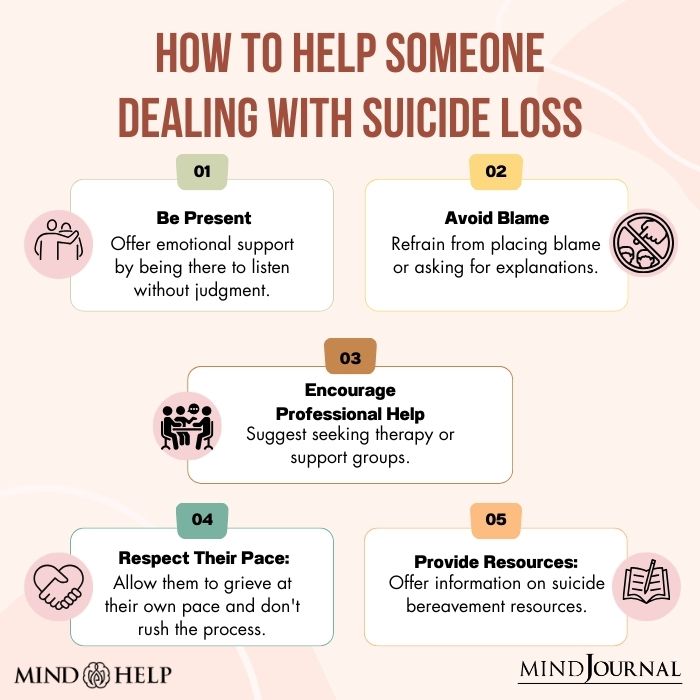
Takeaway
Suicide grief is a deeply complex and challenging journey marked by profound loss, stigma, and emotional turmoil. Yet, through understanding, support (like suicide grief counseling), and open conversations about mental health, survivors can find hope and healing, honoring the memories of their loved ones while working towards a brighter future.
At A Glance
- Suicide grief is a profound form of bereavement experienced when a loved one dies by suicide.
- The global prevalence of suicide grief is challenging to estimate due to under reporting.
- Signs of dealing with suicide loss encompass intrusive thoughts, persistent questioning, guilt, anger, social withdrawal, and changes in sleep and appetite.
- Dealing with suicide loss can lead to various mental health conditions such as major depressive disorder (MDD), post-traumatic stress disorder (PTSD), anxiety disorders, substance abuse, and an increased risk of suicidal thoughts.
- Treatment for suicide bereavement involves suicide grief counseling, psychotherapies, etc.
- Measures on how to deal with suicide grief encompasses self-care practices, social support, etc.
Frequently Asked Questions (FAQs)
1. How do people feel when a loved one dies by suicide?
When a loved one dies by suicide, people often feel a complex mix of emotions, including shock, guilt, anger, sadness, confusion, and profound suicide grief.
2. How is suicide bereavement different from other types of bereavement?
Suicide bereavement differs from other types of bereavement due to the stigma, intense guilt and self-blame, trauma responses, and the challenging, often prolonged grieving process associated with suicide loss.
3. Does asking someone about suicide put the idea in their head?
Asking someone about suicide does not inherently put the idea in their head, but it can open up a conversation that allows them to express their feelings and seek help.
4. What do I do if I see suicidal messages on social media?
If you see suicidal messages on social media, take them seriously and report the content to the platform. If possible, reach out to the person or their trusted contacts to ensure they receive support and assistance.
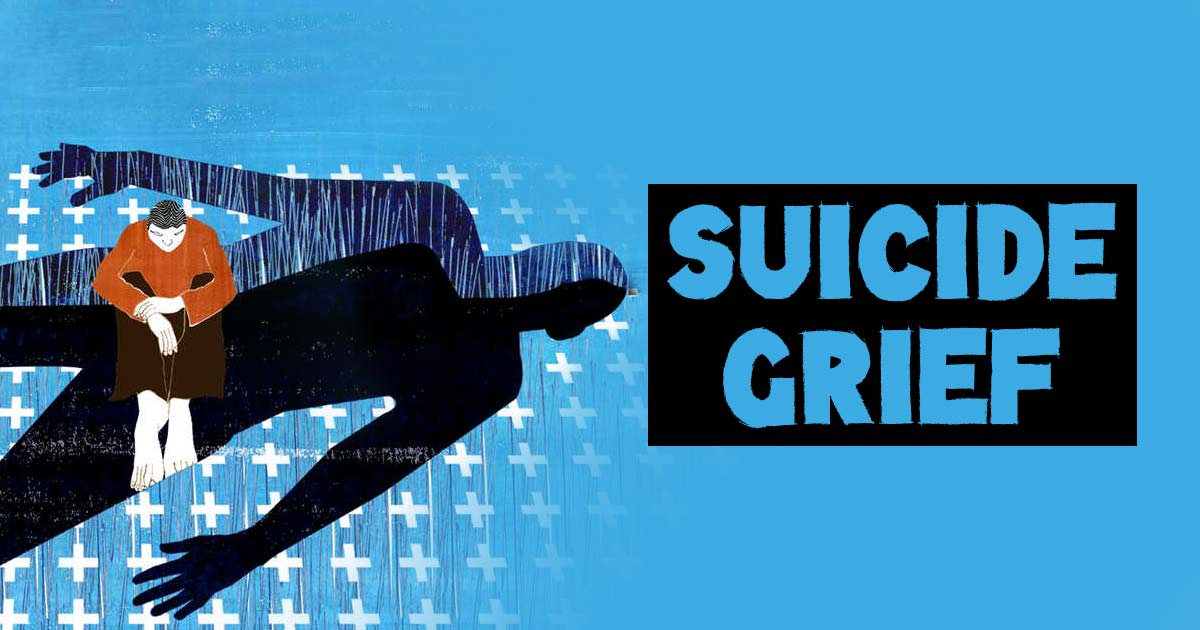
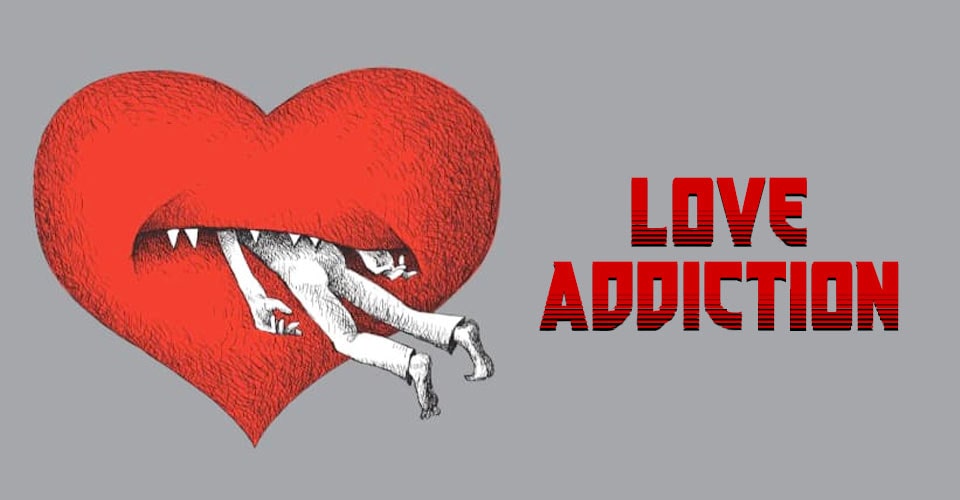
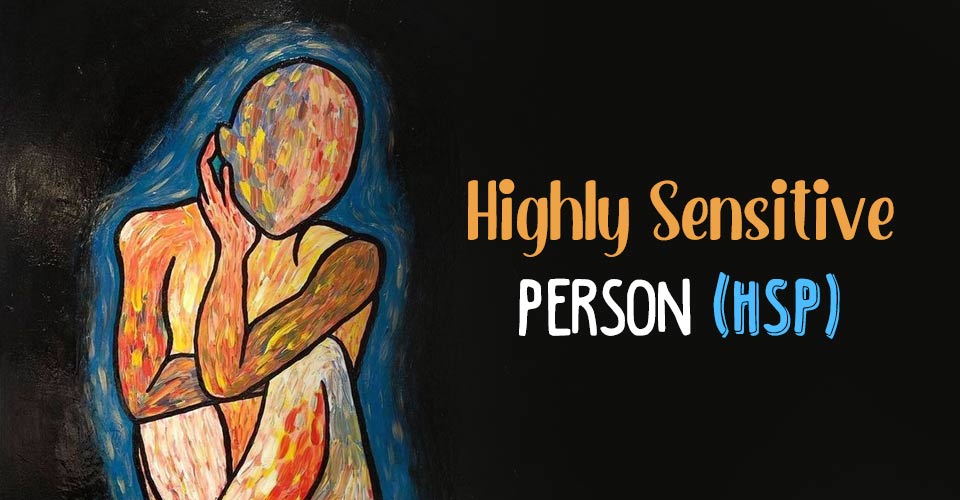

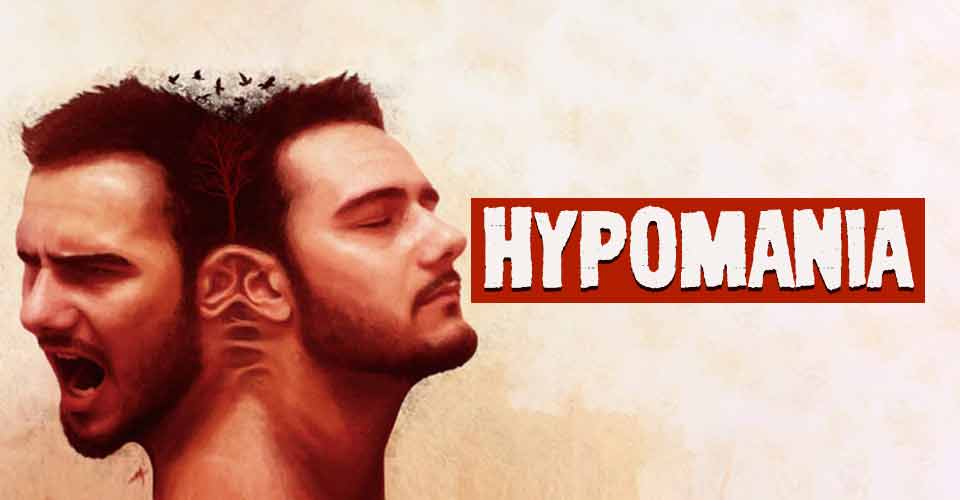



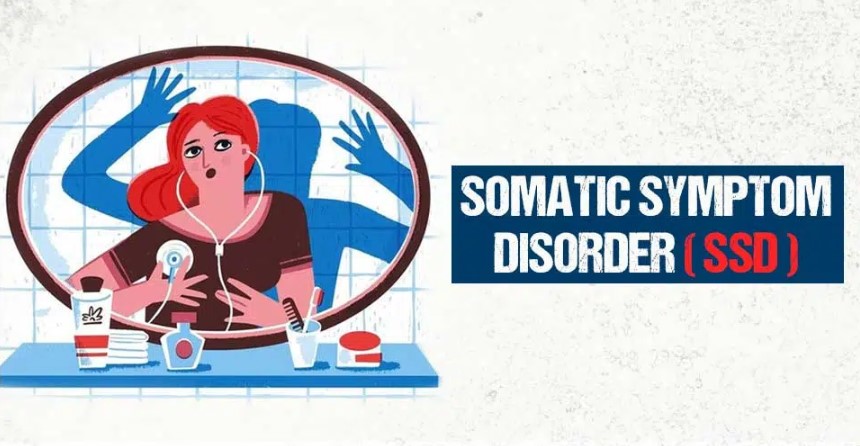

Leave a Reply